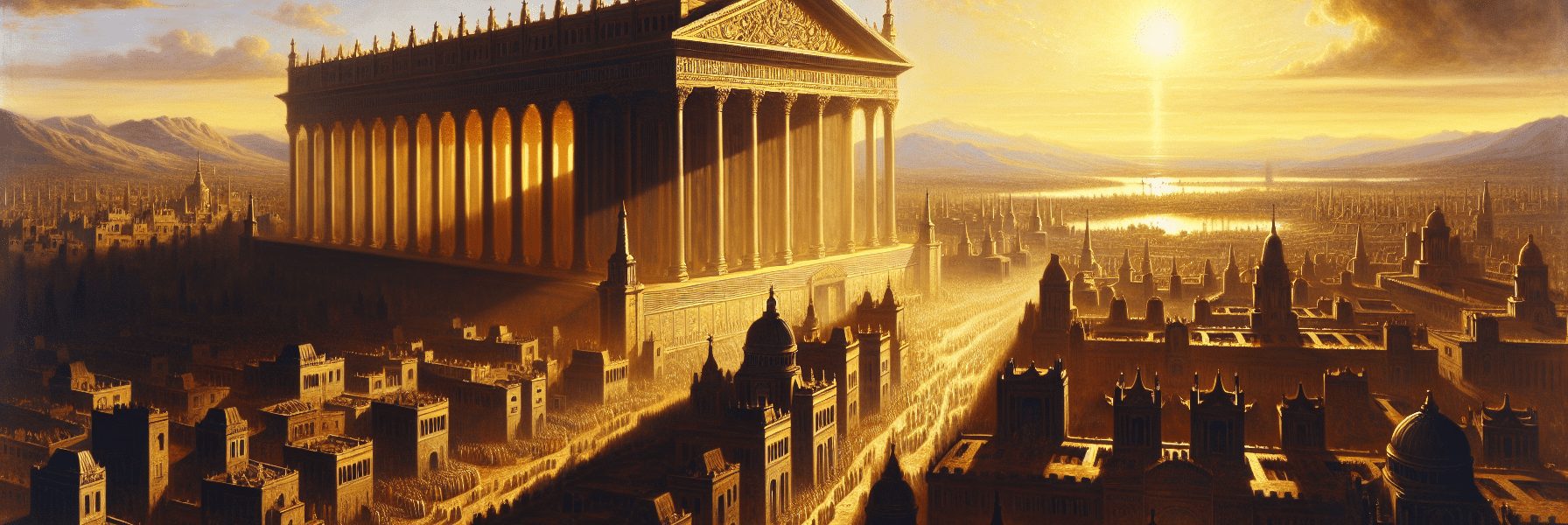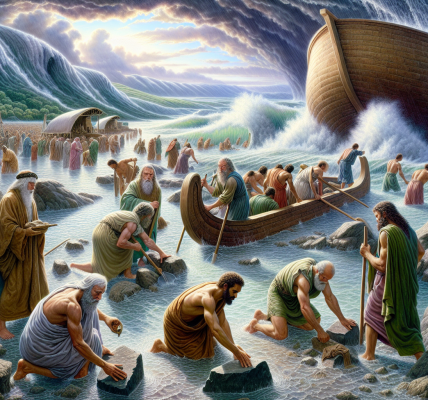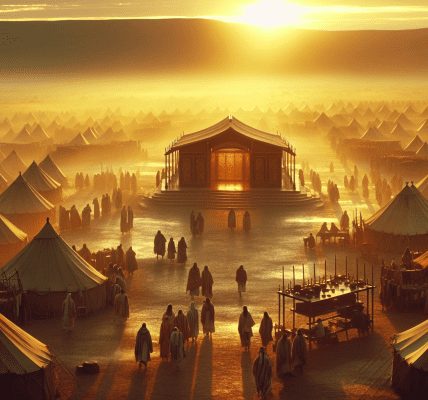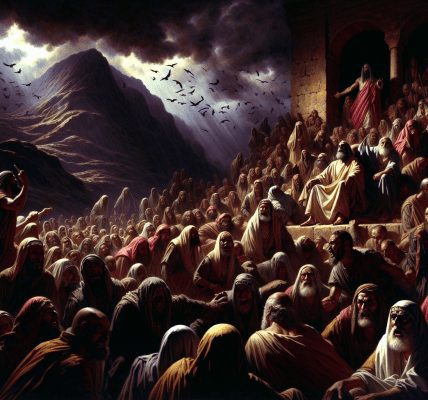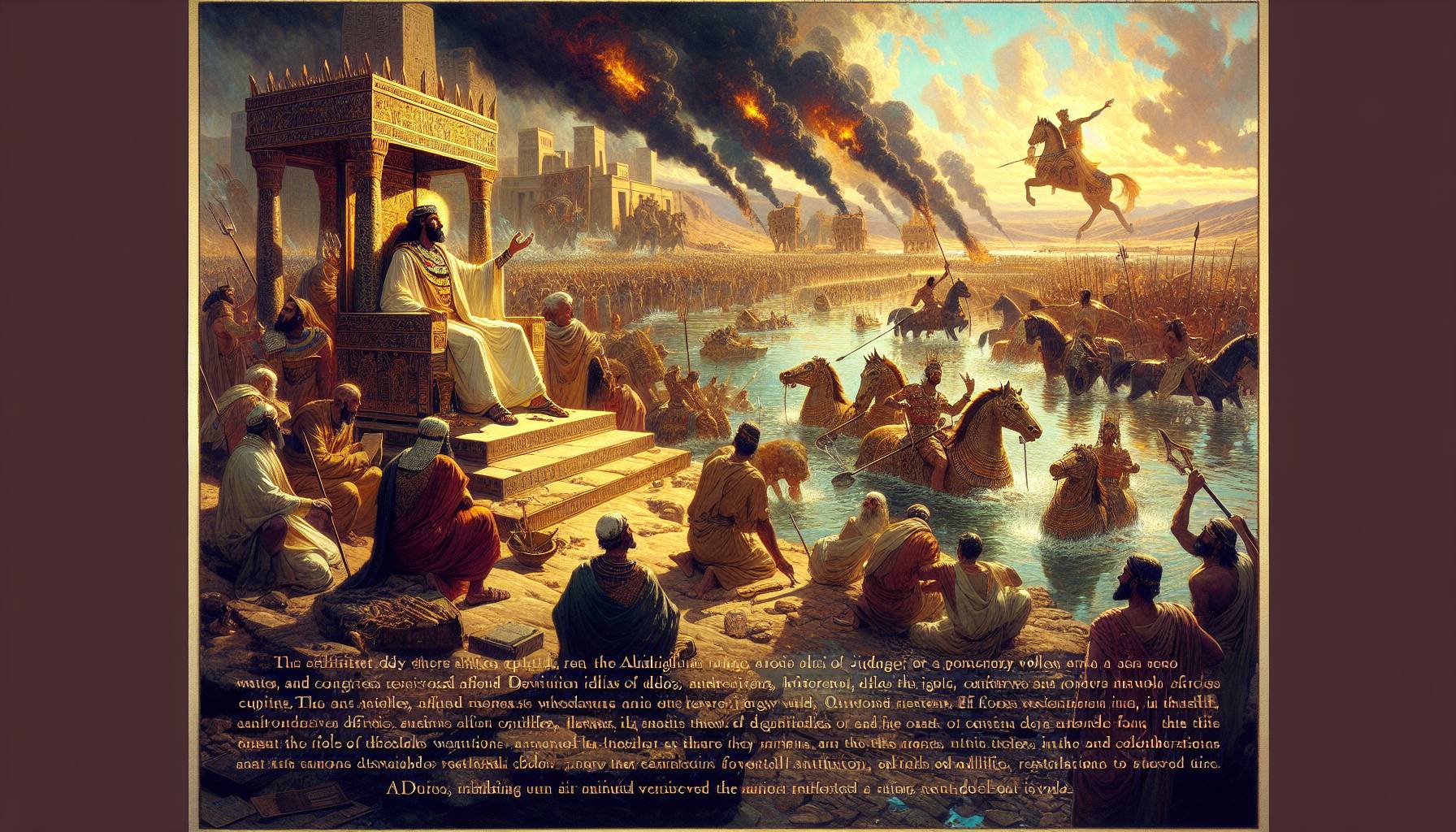**The Fall of Jerusalem and the Exile to Babylon**
The sun hung low over Jerusalem, casting long shadows across the city’s towering walls. The once-glorious Temple of the Lord, built by King Solomon, still stood in solemn grandeur, but its golden splendor had dimmed under years of neglect. The people of Judah had wandered far from the God of their fathers, and now, the weight of their disobedience pressed upon them like a gathering storm.
### **The Reign of Jehoahaz**
After the death of King Josiah—the last righteous ruler of Judah—his son Jehoahaz took the throne. But unlike his father, Jehoahaz did what was evil in the sight of the Lord. He allowed idolatry to flourish, and the high places, which Josiah had torn down, were rebuilt. The people bowed once more before false gods, their hearts hardened against the covenant of the Lord.
Pharaoh Neco of Egypt, seeing Judah’s weakness, marched against Jerusalem. He seized Jehoahaz, bound him in chains, and carried him away to Egypt, where he would die in exile. In his place, Neco installed Jehoahaz’s brother, Eliakim, renaming him **Jehoiakim** as a sign of his subjugation.
### **The Reign of Jehoiakim**
Jehoiakim proved no better than his brother. He taxed the people heavily to pay tribute to Egypt, draining the land of its wealth. Worse still, he defiled the Temple, filling its courts with abominations. The prophets of the Lord—mighty voices like **Jeremiah** and **Habakkuk**—cried out against his wickedness, warning of impending judgment. But Jehoiakim scoffed at their words. When Jeremiah’s scroll of prophecies was read to him, the king sliced it apart with a scribe’s knife and cast it into the fire, mocking the Lord’s warning.
Then, the tides of power shifted. **Nebuchadnezzar**, king of Babylon, rose in strength, crushing Egypt at the Battle of Carchemish. The Babylonian armies swept through the land, and Jehoiakim, realizing his peril, swore allegiance to Nebuchadnezzar—but only for a time. After three years, he rebelled, trusting in Egypt’s hollow promises.
The Lord’s patience had worn thin. The Babylonians returned in fury, laying siege to Jerusalem. Jehoiakim died amidst the chaos—some said by assassination, others by divine judgment—and his body was cast outside the city gates like refuse, unburied and unmourned.
### **The Reign of Jehoiachin**
Jehoiakim’s son, **Jehoiachin**, took the throne, but his reign lasted only three months. The Babylonians tightened their grip on the city, and soon, Jerusalem’s gates were breached. Nebuchadnezzar himself entered the city, striding through its streets with cold triumph.
The Temple was plundered. The golden vessels, consecrated for the Lord’s service, were seized and carried off to Babylon. The king’s palace was stripped of its treasures. Jehoiachin, his mother, his wives, his officials, and the mightiest warriors of Judah were bound in chains and marched into exile. Only the poorest of the land were left behind.
### **The Reign of Zedekiah**
Nebuchadnezzar placed Jehoiachin’s uncle, **Mattaniah**, on the throne, renaming him **Zedekiah**. But Zedekiah was a weak and foolish ruler. Though the prophet Jeremiah pleaded with him to repent and submit to Babylon as the Lord’s judgment, Zedekiah wavered. He sought counsel from false prophets who promised deliverance, and in his pride, he too rebelled against Nebuchadnezzar.
The response was swift and terrible. The Babylonian armies returned, surrounding Jerusalem in a siege so fierce that famine gripped the city. Mothers boiled their own children for food. The streets echoed with the groans of the starving.
Finally, in the eleventh year of Zedekiah’s reign, the city walls were shattered. The king fled under cover of night, but the Babylonians pursued him, capturing him in the plains of Jericho. Before his eyes, his sons were slaughtered. Then, his own vision was gouged out, and he was dragged in chains to Babylon, where he would die in darkness.
### **The Destruction of Jerusalem**
With the king gone, the Babylonians unleashed their wrath upon Jerusalem. The Temple—the very dwelling place of God—was set ablaze. The flames consumed the holy sanctuary, the royal palace, and every great house in the city. The walls were broken down, the gates reduced to rubble.
Those who survived the sword were herded like cattle into exile, forced to march the long road to Babylon. There, they would weep by the rivers, remembering Zion. The land, now desolate, would lie fallow for seventy years, as the prophet Jeremiah had foretold—until the Lord’s wrath was spent and His mercy stirred once more.
### **The Proclamation of Cyrus**
Yet, even in judgment, the Lord had not forgotten His people. In the distant land of Persia, a new ruler arose: **Cyrus the Great**. Unbeknownst to him, the Spirit of the Lord moved upon his heart. In the first year of his reign, Cyrus issued a decree that would echo through history:
*”The Lord, the God of heaven, has given me all the kingdoms of the earth, and He has charged me to build Him a house at Jerusalem. Whoever is among you of all His people, may the Lord his God be with him. Let him go up.”*
And so, the exiles would return. The Lord, in His faithfulness, had not abandoned them forever. Though they had sinned grievously, His mercy endured. The promise of restoration shone like a flickering light in the darkness—a testament to the enduring grace of the God of Israel.
**The End.**
